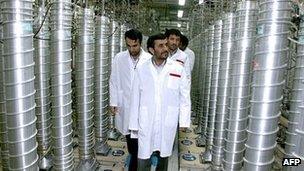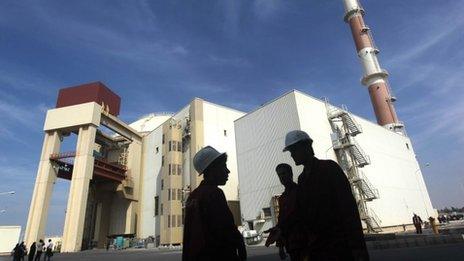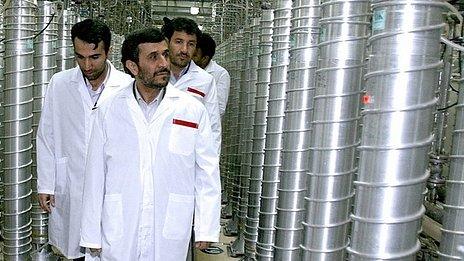Why the White House is not on the war path over Iran
- Published
- comments

Iran's leaders have long said their nuclear programme is about power generation, not weapons
The US is going to press for new economic sanctions against Iran, this time after the latest UN report on Iran's nuclear plans.
Senior officials say they will try to "ratchet up the pressure" on Iran, making it more expensive to do business in that country, with the aim of hurting its economy.
But what they are not doing is more important. The White House is not dusting off any military plans.
When I asked an official about the military option, he said that nothing was off the table but there was "plenty of space" to build more pressure through sanctions. Iran had to demonstrate to the world that its nuclear programme was peaceful, he said.
What then about the possibility of an Israeli attack? Sources close to the US administration have told the BBC that they don't think that is on the cards either. Any such talk is sabre-rattling. I don't get the impression the White House worries that the report would lead Israel to take action.
In fact, they almost seem to be playing the whole thing down, saying the report shows that between 1998 and 2003, Iran had a "very structured, very well-organised" nuclear weapons programme under the auspices of its ministry of defence. It was "soup to nuts", as one official put it.
But this programme was abandoned, one of the main sites literally bulldozed into the ground. Since then there have been "tell-tale signs of nuclear weapons work" which raise "very serious concerns".
Is Iran nearer to making a nuclear bomb now than it was in 2003, I asked.
"There has been some advancement, but it hasn't been that dramatic," the official said, adding that the report did not have a firm conclusion about this.
The White House could hardly sound less bellicose.
It is not surprising. The last thing Barack Obama wants is an attack. It is, one hopes, hardly his main consideration, but in the approach to an election year, domestic politics do play.
Any action would dominate a campaign, distract from what he wants to say on the US economy and undermine the support of his Democratic base.
More importantly, Mr Obama is likely to share the view of experts who say an attack would not achieve its goals, and instead spiral out of control into a regional war. That would most likely plunge the US and Europe into a new recession.
From the Oval Office, more sanctions look like an altogether safer bet than war.
- Published9 November 2011

- Published8 November 2011
